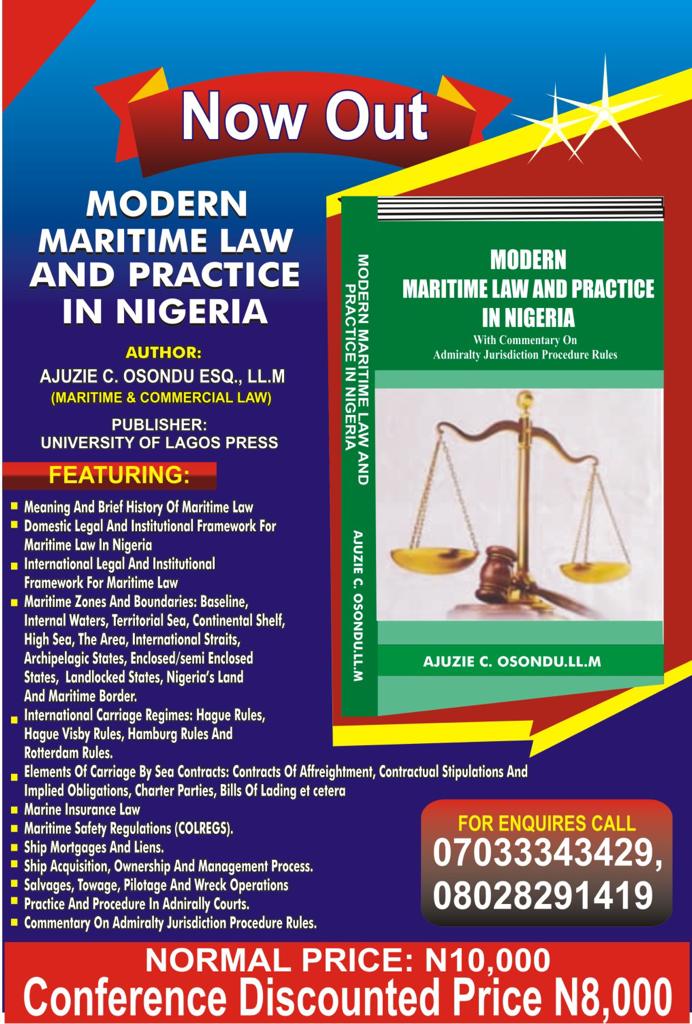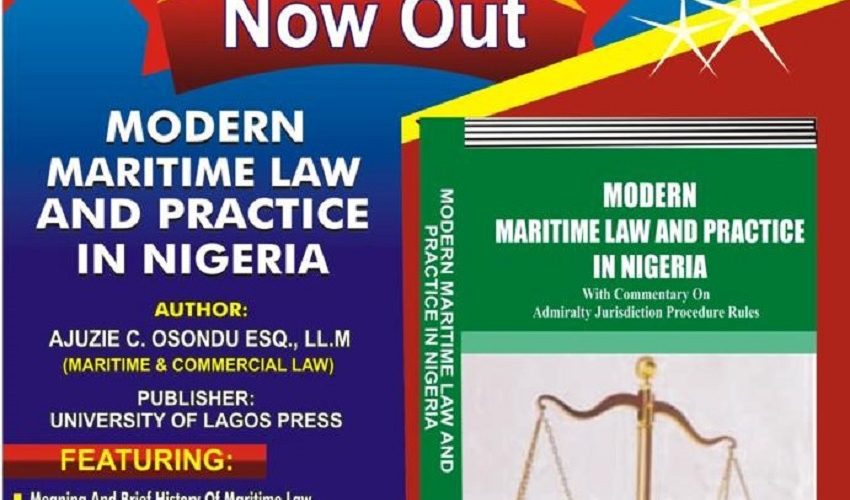MARITIME LAW BOOK NOW AVAILABLE AT AGC
A text on Maritime Law and Practice in now available for purchase at the ongoing NBA Annual General Conference.
Authored by a leading text writer on Law, Mr. Osondu Ajuzie, the book comes highly recommended.
The book, Modern Maritime Law and Practice in Nigeria, is available for purchase at discounted AGC rate.
See flyer for details.
Title of Book: Modern Maritime Law and Practice in Nigeria
Name of Book Reviewer: Professor Paul C. Ananaba (SAN).
Area of Relevance: Admiralty/Maritime Industry
Publisher: University of Lagos Press
Year of Publication: 2020
Place of Publication: Lagos, Nigeria
Name of Author: Ajuzie Chizoba Osondu
Author’s Qualifications: Double LL.M (University of Lagos and Lagos State University); Ph.D Candidate (Babcock University)
Page Extent: 473 (excluding Preliminary Pages)
Number of Chapters: 12 Chapters
Chapter 1 Meaning and Brief History of Maritime Law
Discussed issues such as meaning of maritime law; reason for its emergence; distinction between maritime and admiralty law; origin and development of international maritime law; history of English maritime law; origin and development of Nigerian maritime jurisdiction; establishment of the Federal Revenue Court, admiralty jurisdiction controversy and resolution of the controversy; the bases of the present exclusive admiralty jurisdiction of the Federal High Court and the extent thereof.
Chapter 2 Domestic Legal and Institutional Framework
It ex-rays topical issues such as constitutional and legislative framework for maritime regulation in Nigeria; domestic maritime regulatory institutions, such as Nigerian Maritime Administration and Safety Agency (NIMASA), National Inland Waterways Authority (NIWA), Nigerian Ports Authority (NPA), Maritime Academy of Nigeria (MAN), et cetera; admiralty jurisdiction regulatory statutes, such as NIMASA Act, Coastal and Inland Shipping (Cabotage) Act; Merchant Shipping Act, et cetera; domestic marine pollution prevention statutes; maritime cabotage, amongst other topical issues.
Chapter 3 International Legal and Institutional Framework
It features such topics as international maritime regulatory instruments, such as United Nations Convention on the Law of the Sea (UNCLOS); instruments for the protection of the marine environment from pollution, such as International Convention on Civil Liability for Oil Pollution Damage (CLC Convention), International Convention on the Establishment of an International Fund for Compensation for Oil Pollution Damage (the Fund Convention), International Convention for the Prevention of Pollution from Ships (MARPOL), et cetera; instruments relating to safety of life at sea, such as the United Nations Convention on Safety of Life at Sea (SOLAS); International Convention on Standards of Training, Certification and Watchkeeping for Seafarers (STCW), International Convention on Marine Search and Rescue (SAR), and a host of others.
Chapter 4 Maritime Zones and Boundaries
Discussed issues related to Maritime Zones and Boundaries, with particular reference to definition of maritime boundary; applicable laws, such as UNCLOS; delimitation of international maritime boundaries with particular reference to Baseline, Internal Waters, Territorial Sea, Contiguous Zone, Exclusive Economic Zone, Continental Shelf, High Seas, The Area, International Straits, Archipelagic States, Regime of Islands, and Enclosed and Semi-Enclosed States, and Land-locked States, Nigeria’s land and maritime borders, and economic potentials derivable from Nigeria’s maritime zones, such as the continental shelf and the seabed resources thereof.
Chapter 5 International Conventions Applicable to Carriage by Sea Contracts with particular reference to the International Convention for the Unification of Certain Rules of Law Relating to Bills of Lading 1924 (The Hague Rules), its First and Second Protocols 1968 and 1979 (The Hague/Visby Rules), the United Nations Convention on the Carriage of Goods by Sea 1978 (Hamburg Rules), comparison of the Hague/Visby and Hamburg Rules, and the United Nations Convention on Contracts for the International Carriage of Goods Wholly or Partly by Sea (The Rotterdam Rules).
Chapter 6 Elements of Carriage by Sea Contracts
Discussions in this chapter centre on topics such as Charter Party Contracts or Contracts of Affreightment; Contractual stipulations or Implied Obligations; Shipowner’s duties or basic obligations under charter parties; Charterer’s duties or basic obligations under charter parties; Application of International Conventions to charter parties; Contracts of General Carriage by Sea; and Average.
Chapter 7 Marine Insurance Law
with particular reference to Meaning of Insurance; Definition of Marine Insurance; Divisions of Marine Insurance; Ancient origin and connection with Lloyd’s of London; Basic issues and applicable Statutes; representations pending negotiation of contract; Indemnity; Indemnity under the Marine Insurance Act; Warranties; Marine Insurance Policies; Risks commonly covered by marine insurance policies; Perils of the Sea; Assignment of Policy; Losses; Proof of Loss, et cetera.
Chapter 8 Maritime Safety Regulations
with particular reference to applicable International Conventions; Employment of Right calibre of Ship’s Master and Crew Members; Compliance with Safety Management Systems; Collision Regulations; Nigeria’s status in relation to the Collision Convention 1910; and Defences available in actions for collision damage.
Chapter 9 Ship Mortgages and Liens
with particular reference to definition and nature of ship mortgage; need for ship mortgage transactions; how safe is the mortgagee in mortgage transactions; distinction between Mortgage, Charge, Pledge and Lien; types of ship mortgages; international Conventions relating to maritime lien and mortgages; rights and obligations of parties to a ship mortgage; and sale or mortgage of a ship outside Nigeria.
Chapter 10 Ship Ownership and Management Process.
Covers topics such as Ship Ownership; reasons and need for ship registration; meaning of ship and ship registration; legal consequences of ship registration; agency responsible for ship registration; ships that may be registered in Nigeria; and procedure of application for ship registration.
Chapter 11 Elements of “SalTowPil”
“SalTowPil” is a short form for salvage, towage and pilotage coined by the author. Discussions in this chapter centre on Salvage operations; Towage operations; Pilotage operations and Wreck operations.
Chapter 12 Practice and Procedure in Admiralty Courts
with particular reference to appropriate authority and power to make rules; Sources of authority to make rules; conflict of rules; and summary of Admiralty Jurisdiction Procedure Rules 2011.
I highly recommend that the book will be of immense benefit and aid to Legal Practitioners in the area of Maritime/Admiralty Law, Lecturers, students at undergraduate and postgraduate levels, Maritime Practitioners, Administrators and Agencies, Judges and Federal and States Ministries of Justice, officials of the Nigerian Maritime Administration and Safety Agency, Nigerian Ports Authority, Ship-owners Associations, Nigerian Shippers’ Council; maritime training institutions, such as Maritime University of Nigeria, Maritime Academy of Nigeria, as well as the general interest reader.
The book is available at the following places: CSS Bookshop Lagos; UNILAG Bookshop; University of Ibadan Bookshop, Ibadan; Booksellers Bookshop Ibadan, Federal High Court Book stands, Court of Appeal Book stands, LASU Faculty of Law Book stand, or direct from Printable Publishing Company (07033343429; 08028291419).

To join our Telegram platform, please click here
COPYRIGHT 2022 CITY LAWYER. Please send emails to citylawyermag@gmail.com. Join us on Facebook at https://web.facebook.com/City-Lawyer-Magazine-434937936684320 and on TWITTER at https://twitter.com/CityLawyerMag. To ADVERTISE in CITY LAWYER, please email citylawyermag@gmail.com or call 08138380083. All materials available on this Website are protected by copyright, trade mark and other proprietary and intellectual property laws. You may not use any of our intellectual property rights without our express written consent or attribution to www.citylawyermag.com. However, you are permitted to print or save to your individual PC, tablet or storage extracts from this Website for your own personal non-commercial use.
